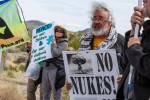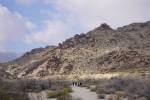Budget cuts Yucca transport hearings
Although there've been plenty of hearings in Nevada on plans to build a repository at Yucca Mountain for disposing highly radioactive waste and the Department of Energy's vision for hauling it there on rail lines and roads, the odds of more formal hearings for people along transportation routes outside the state are slim to none.
That was the word Wednesday from Gary Lanthrum, DOE's director of logistics management for the Yucca Mountain Project, who discussed the issue after his presentation on transportation topics to an independent panel of scientists reviewing the project's work.
While there'll still be a chance to comment online as aspects of the transportation plan evolve and routes are designated a decade or more down the road, the hearing process and opportunity for submitting formal comments ended last week at the conclusion of the comment period for supplemental impact statements on the repository and plans for building a 319-mile railroad in east-central Nevada.
The national transportation plan, as described in a previous impact statement, will be open for comment "forever," Lanthrum said, "as work is accomplished."
"When routes are selected, that will get folded in," he said after his presentation in Las Vegas to the Nuclear Waste Technical Review Board.
"No additional hearings will be held," he said.
Part of the reason is that DOE has met all the requirements for holding formal hearings, even if none on the issue were held in numerous major metropolitan areas where trains and trucks hauling heavy casks of spent nuclear fuel could pass through on their way to the mountain, 100 miles northwest of Las Vegas.
Those hearings, 21 in all, were held in 1999 and 2000 to air the draft environmental impact statement for the planned repository. Nine were held in Nevada and 12 were held elsewhere in the nation, including large communities such as Washington, D.C., and Chicago, and smaller cities such as Boise, Idaho and Lone Pine, Calif.
Another reason for not holding any more formal hearings is because the danger of transporting nuclear waste is not greater, in fact less, in terms of accidents, than with trains and trucks hauling such hazardous materials as chlorine and propane, Lanthrum said. And hearings are not conducted, he said, when those materials are to be shipped through cities that are on the potential route for nuclear waste transportation.
Exceptions could occur, he said, when actual routes are designated. But until those routes are known there's no reason to put more hearings on DOE's agenda.
"When we select actual routes, if impacts are significantly different from what we analyzed, then we'll go back and do additional hearings," he said.
If that occurs, it won't happen for years. The nation's nuclear waste chief, Ward Sproat, told the board and a state legislative committee this week that the transportation program has been "taken off the critical path" in order to use that funding to keep the overall project afloat in the face of budget cuts.
Even with money diverted from the transportation effort to complete the repository's license application this year, Sproat said 500 employees will be laid off in waves.
The program staffs some 2,400 full-time positions, but funding cutbacks by Congress of $108 million from the 2008 budget this late in the fiscal year have left him no choice but to pursue layoffs.
The Bush administration requested $494.5 million for the fiscal year that began on Oct. 1. Congress in December approved $386.5 million.
In the budget request, $104.3 million was supposed to be used to meet transportation milestones. Now, only $15 million is available for transportation after the budget cuts. The focus of using that money, Lanthrum said, "will be getting the EIS (environmental impact statement) done. That's my No. 1 priority," he said.
With the Energy Department scrambling from the effects of budget cuts, Nevada picked up its pace in opposing the multi-billion-dollar project. The Las Vegas City Council voted 6-0 on Wednesday to join the state in its legal battles against the Yucca Mountain Project.
The city and Nevada agreed to be jointly represented by the same counsel, Egan, Fitzpatrick and Malsch in common legal challenges regarding attempts by DOE to obtain a license from the Nuclear Regulatory Commission to build and operate a repository at Yucca Mountain.
Review-Journal writer Alan Choate contributed to this report. Contact reporter Keith Rogers at krogers@ reviewjournal.com or (702) 383-0308.























